Interview with Ambassador Guadalupe Palomeque de Taboada of Bolivia in Seoul
In Korea, we have an old-saying, Jasu Seongga (自手成家), meaning “a self-made man,” a symbol of pride for a person who has succueeded in life.
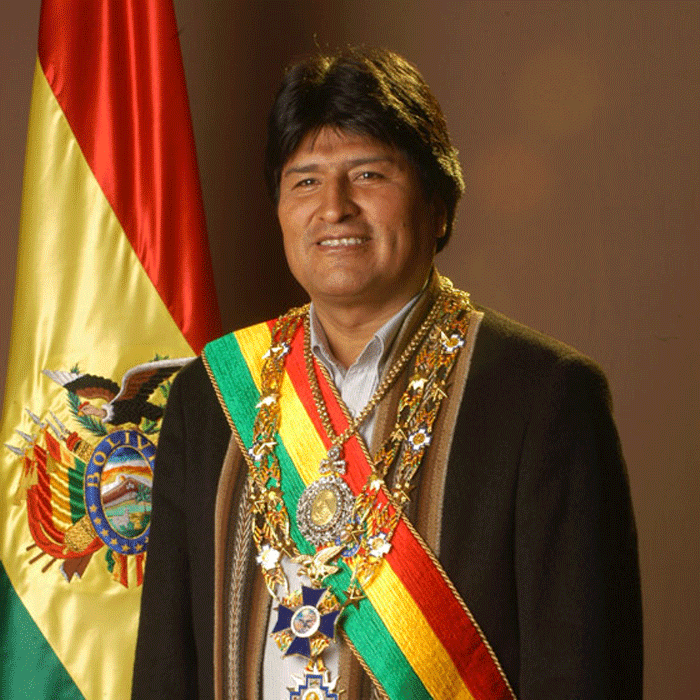
President Park Chung-hee, the most respeted Presdident of the Republic of Korea, was the son of a poor peasant and so was the equally respected Presient Kim Dae-jung. President Lee Myung-bak earned his way through univerfsity from elementary school selling bun on the street. President Roh Moo-hyun was so poor when he was young that he always enviied his elementary classmates from a rich family who had a school satchel. They all worked so hard and made a President in Korea.
We see a similar Presdient in the Reublic of Bolivia.
In a recent inerview with The Korea Post on the occasion of the National Day of Bolivia, Ambassador Madam Guadalupe Palomeque de Taboada of Bolivia in Seoul said, “President Evo Morales Ayma of the Republic of Bolivia was born to a poor Aymara family and since his childhood he worked in agriculture and to pay his studies he worked as a bricklayer, baker and trumpeter.” Here are excerpts from the interviw with Ambassador Madam Palomeque de Taboada:
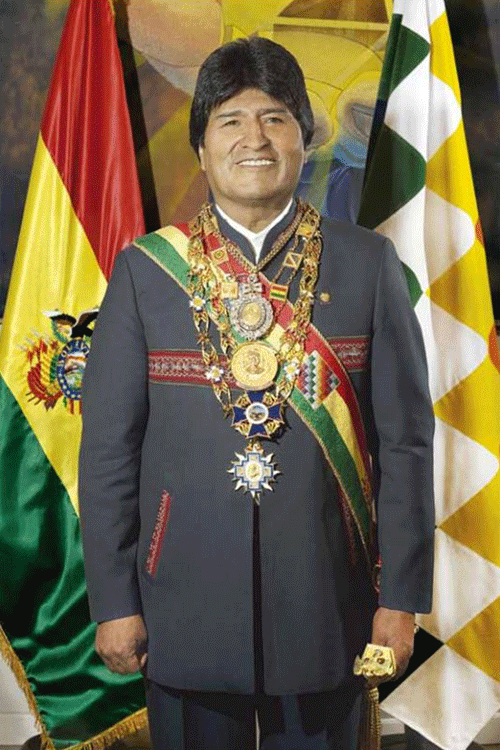
Question: What are the are the important development(s) scheduled between Korea and Your country, including the possible visit of your Chief Executive to Korea? Are there any economic delegations or others coming to Korea?
Answer: Given the diplomatic relations between the former Republic of Bolivia and the Republic of Korea - that started in 1965 - our relations are developing continuously.
Currently the two governments are at their highest relationship level, and this somehow has been displayed through the reopening of the Embassy of Bolivia in Korea last 2013, after 14 years.
However, the agenda is even more diverse like:
Investments: The Republic of Korea has given us a significant example having developed its energy sector without a drop of oil or gas. In Bolivia, we would like to follow this remarkable experience, considering the excellent relationship with the government and the Korean people. A reference to follow is the project that is carried out in the construction of the Ammoniaco-Urea Petrochemical Complex.
In Bolivia, companies besides Samsung, are also working LS-Nikko Copper Inc which has regional operations across seven projects in eight Latin American countries, including Bolivia. This Korean-Japanese company together with Korea are working with copper exploration project in CoroCoro since 2008.
Taking into account that South Korea has the 6th largest mineral consumers resources and so far 24% of total investment allocated to energy and mining; petrochemical ethylene, occupies the 4th place overall and 7th place in petrochemical industry, this gives us a pattern that we could be a partner country in the development of certain defined goals, related to the hydrocarbon industrialization.
Furthermore, Bolivia has not only non-renewable resources, it is a country that offers opportunities to develop other areas and we are able to attract other investment in sectors such as telecommunications, digital health, education, and build a digital agenda that would respond to our needs and requires in this century.
On the other hand the current cooperation projects under development by the Republic of Korea are in the areas of health, agriculture and energy. Health through the building of hospitals; in Agriculture with irrigation projects, groundwater use and energy supply, project of electricity and water, through solar power generation.
In relation to Bolivian delegations that visited Seoul, during this year we have received high-level visitors from the Bolivian Legislative Assembly; the Vice President of the Supreme Electoral Tribunal and entrepreneurs for some commercial business events. These visits are increasing month by month.
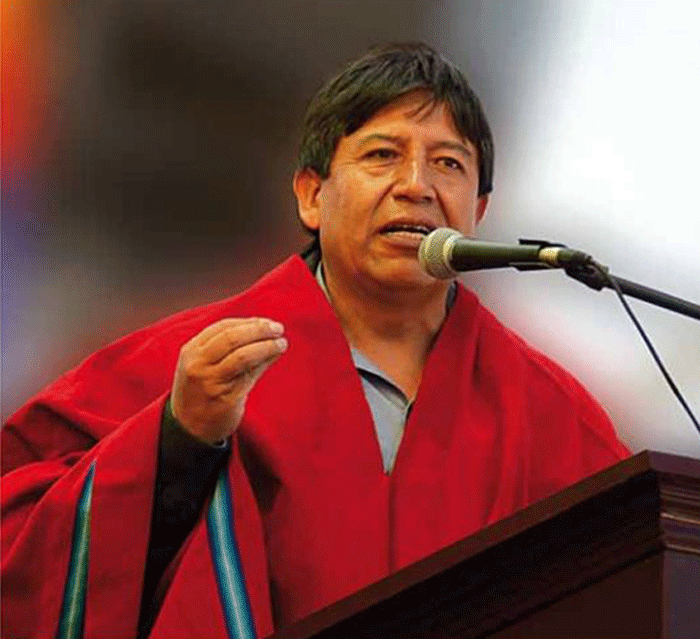
Q: Please introduce in detail the chief Executive /Head of Government) of your country, including major achievements.
A: Evo Morales Ayma, Elected President of the Plurinational State of Bolivia, was born on October 26th 1959, in Orinoka, Department of Oruro. Descended from an Aymara family and since his childhood he worked in agriculture. To pay his studies, he worked as a bricklayer, baker and trumpeter. His subsequent training was delineated as he himself says at the "university of life".
In 1983 he began his political career by being a union leader. In 1997 he was elected Uninominal deputy.
During general elections in June, 2002, the Movement Toward Socialism (MAS), led by Evo Morales, breaks all party structures of Bolivia, to gain the support of the people and obtaining 36 congressmen, living expression of multicultural Bolivia and multi-ethnic. Later, by municipal elections in December, 2004, MAS became the first political force.
Evo Morales won the general elections on December 18th, 2005 (assuming the Presidency on January 22nd, 2006), obtaining 54.74% of the votes being re-elected by referendum on December 6th 2009, with 64.22 % of the votes.
During his 9 years government, Evo Morales was able to develop social measures for the elderly, mothers, children and students, through the support of the income obtained by the process of strategic productive enterprises nationalization.
The orbiting Satellite Tupac Katari enables the human right to communication, cellular telephony and Internet, with social and affordable rates for all Bolivians.
In December 2008, Bolivia was declared by UNESCO, a country free of illiteracy.
In food area, the State guarantees the production of food for all Bolivians, through Business Support Food Production (EMAPA).
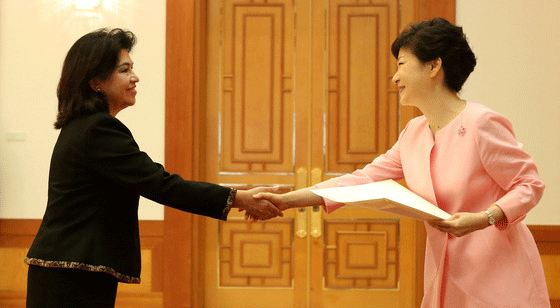
Q: What is the volume of bilateral trade and its outlook in the future?
A: The Bolivian exports to South Korea represents 3.28% of our sales to the world. These are essentially: mineral silver, zinc, lead and copper concentrates, representing 98% and the rest with much less involvement: some lower shipments of leather, unroasted coffee, textiles fine animal hair, among others.
In figures, this means that the Bolivian exports to the Republic of Korea in 2013 recorded a $us. 404,621,650 and imports $ 621.650 $us.101, 524.232, giving a favorable trade balance for Bolivia, $us.303, 097.418. Similar situation, with smaller amounts were recorded in 2012.
The aim is to increase these figures but with more diversified export supply from Bolivia.
Please explain in detail the National Day of your country.
In theory, Bolivia proclaimed its freedom in 1809, but it took 16 years of war before Bolivia became a Republic, named for the hero Sim?n Bol?var, on August 6, 1825. Simon Bolivar was a Venezuelan military and political leader who led numerous wars against Spanish colonial rule in the South American region.
Prior to Spanish colonization, the Bolivian Andean region was part of the Inca Empire, while the northern and eastern lowlands were inhabited by independent tribes. The Spanish occupation of Bolivia, previously known as Upper Peru or Charcas, began in 1525. During most of the Spanish colonial period, Bolivia was known as Upper Peru and was administered by the Royal Court of Charcas
Q: What are the major tourist destinations of your country?
A: Bolivia has many tourist places to visit, some of them are:
Uyuni Salthflat, the Natural Reservoir Eduardo Avaroa, in Sud Lipez, treasures natural and geological richness of beauty beyond comparison. There takes place a combination of strange rock formations, deep pools of thermal waters, geisers and the famous colored lagoons: the Colorada (red) and Verde (green) lagoons.
The capital of Bolivia, Sucre is one of the most beautiful colonial cities of America. It was the seat of the Audiencia de Charcas in colonial time. It preserves a magnificent colonial and neoclassic republican heritage.
Potosi, city declared world heritage by UNESCO. This city during mid-17th Century, as Imperial Villa was synonym of the highest wealth and splendor, as such point as to become one of the most important metropolis in the world.
Oruro Carnival declared by UNESCO Oral and Intangible Heritage of Humanity shows spectacular dances such as Diablada, Morenada, Caporales and Tinku, with extraordinary plasticity and color.
Tiwanacu, the most important archeological heritage in Bolivia, by the refinement of its architecture and stone sculptures, expressed in unique monuments such as la Puerta del Sol (the Gate of the Sun), the Templete Semi subterraneo (semisubterranean Temple), the Piramide de Akapana (Pyramid of Akapana) or the amazing Kalasasaya.
Madidi National Park in the North of La Paz, is one of the protected areas beholding the largest biodiversity in the world. Madidi is one of the most visited destinations in Bolivia and a reference for environmentalists, biologists, nature specialists throughout the planet.
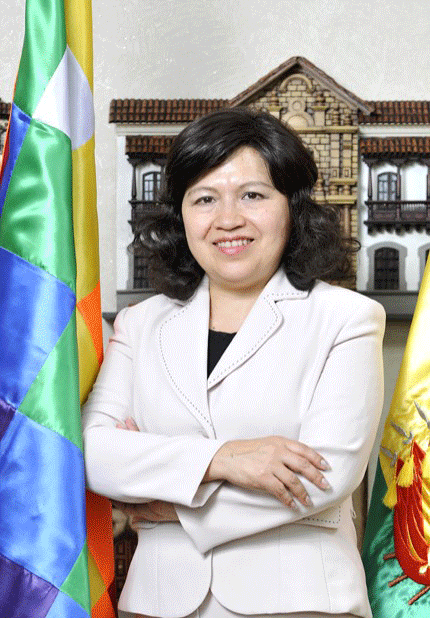
Q: Please introduce yourself in detail, to include your career, family and hobbies.
A: I am a lawyer, specialist in International Trade. Working with the Ministry of Foreign Affairs for 26 years. Previously I served in three positions at the Foreign Service. In 2013, I was appointed Ambassador, being my first job the reopening of our Diplomatic Mission in South Korea
I always like to see new places. I hope to continue this way accompanied by my husband Antonio Taboada Bilbao La Vieja.
Q: Please state whatever might have been covered by your interview questionnaire.
A: Finally, I would emphasize that, if one of the main tasks of an Ambassador is to support their compatriots abroad, I have the satisfaction to report that recently the Bolivian community in South Korea established the "Casa Bolivia - Korea." This partnership has already started its work with Spanish lessons for their children, in order to maintain their Bolivian roots.

